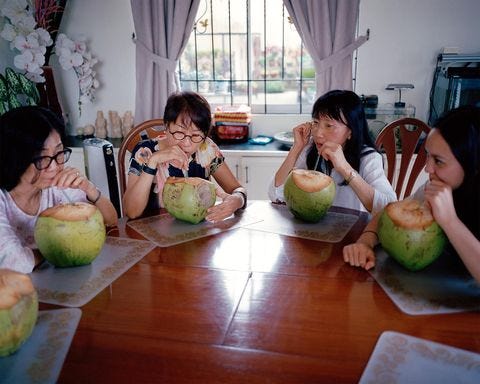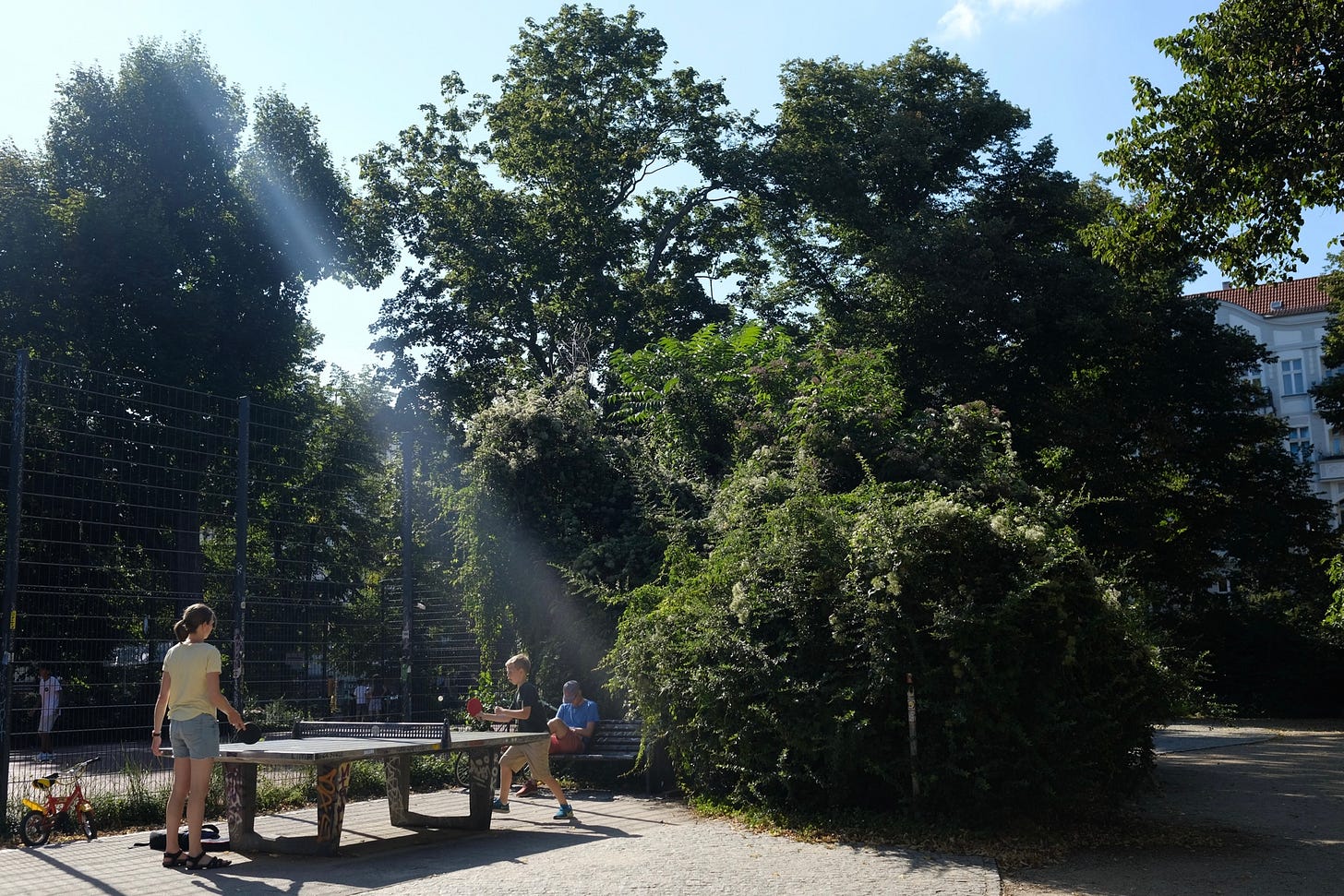Here’s a passage from a short story about the rapacious development of a town through one man’s eyes, with a nice touch of surrealism that elevates:
The changes were stunning, almost impossible to believe, but a lot could happen in three weeks, especially in a town like this. Levinson was all too familiar with the kind of person who deplored change, who swooned over old buildings and spoke vaguely but reverently of earlier times, and though he was startled and a little dizzied by the sight of the new downtown, which made him wonder whether he had fallen asleep on his front porch and was dreaming it all, he looked out at the street with sharp interest, for he was wide awake, drinking his iced cappuccino on a Saturday afternoon in town, and was not one of those people who, whenever the wrecking ball swung against the side of a building, felt that a country or a civilization was coming to an end.
—Steven Millhauser, “Coming Soon”
Friends and readers, hello again.
I turned another year old some days ago in a city where I don’t quite have my own community yet, so I spent it quietly, and simply, but with good feeling.
I woke up to a lovely surprise from W.C., spent half the day finishing up a deadline that I’d had to extend, attended a cousin’s wedding via Zoom with family, cozied up in a cafe where we sat indoors for the first time, spoke with friends (and their adorable children) on the phone, and played Ticket to Ride while having a home-cooked dinner of gnocchi stewed with a creamy red pepper-and-wine sauce. My parents also had an orchid plant and a bouquet of roses delivered—something we’ve taken to doing for each other over this pandemic. Since the first time W.C. delivered flowers to my family’s house back in KL when we were still apart, we’ve all been doing the same for each other. The pandemic, as hard as it has been on so many, has been a reminder to be good to the people who matter in your life—to not just appreciate them in your heart and come through in difficult times, but to also show them you care on a more consistent basis. Admittedly, I have a lot of room for improvement in this.
Thinking about birthdays: I feel like I’ve tended to play down my own after my university years, during which there was always a merry-go-round of celebrations among my circle of friends. It’s not so much to do with dreading the physical aspects of growing old, but a sense that I’ve felt less comfortable making things about me—and perhaps there’s a sense of guilt too, in asking people to come out on a particular day when you haven’t seen some of them for a long time.
Then again, why see it that way? Shouldn’t any reason to gather be a welcome thing? Or, put another way: Why does it have to be about ourselves? The times I did call for a bigger celebration I think we all always enjoyed having a reason to see each other again. It’s just another occasion to celebrate friendships. All this makes me think of a newsletter by Sari Botton called Oldster Magazine—not about the experience of “old people”, so to speak, but the experience of growing older, no matter what your age.
The other thing about growing older as a writer is, you’re always anxious about whether you’ve produced enough good work. When you’re in your twenties, it’s enough that you show your potential. When you’re in your thirties, you wonder if you’ve manifested it sufficiently, and how much more room you have to adapt and grow. It’s not so simple, and I do know better. Some of the world’s most famous writers got their start writing books in their forties or later—Toni Morrison, Helen DeWitt, Raymond Chandler, and more recently, Jocelyn Nicole Johnson. There’s time still to make concrete one’s dream writing projects, and as Mary Oliver said, “Things take the time they take. Don’t worry.” I have to remind myself of this, because there is so much more I want to do. As soon as you finish one thing, there’s always the next thing, and then the next thing.
In her poem Tomorrow Is a Place, Sanna Wani writes:
There is a tenderness to growing older and we are listening for it. Steadier ways to move through the world and we are learning them. A way to touch your own body. A touch that says, Dig deeper. There, in the ground, there is our memory. I am near enough my roots. Time is my friend. Tomorrow is a place we are together.
It’s beautiful. Read the whole thing.
Making sense of our place in the world
The Man Who Sailed His House by Michael Paterniti, a miraculous tale of surviving the 2011 Japanese tsunami:
You decided to abdicate to nature—or stand up to it—because somewhere inside, you had a flash of invincibility; that is, you thought, If my life is worthy and my house is well made, it will be strong enough to stand up to the wave—and the moon and stars (none of which care for you, Hiromitsu, nor soothe or feed or augur). You realize now that once you arrived home, once shown the precious thing about to be taken away forever, once you saw the garden and barn, the koi pond and the pigeons, and Yuko arrived with the rice seed, you knew you wouldn't be able to leave—that you would be doomed by obligation and memory and sentimental attachment—which is how you’ve ended up here now, on the roof of your house, nine miles out to sea.
Dancing Through New York in a Summer of Joy and Grief by Carina del Valle Schorske:
I’ve never known what “despojo” means, precisely, though it’s a word I use with some frequency to express a physical craving for spiritual catharsis: “Necesitamos despojo, quiero despojarme.” Or, watching a friend gain momentum on the dance floor and begin to enter a self-forgetful trance: “Esoooo! Des-po-jo!” My Spanish-English dictionary has only the verb (to despoil, to shed leaves) and the plural noun (the spoils of war, mortal remains, rubble, waste). Google Translate: dispossession.
The politics of archaeology in Jerusalem by Rachel Poser:
Archaeologists reconstruct the past based on whatever material has happened to linger in the ground for thousands of years—a tiny percentage of what existed at the time. Turning that partial record into a narrative about people and events takes a deep knowledge of history and some degree of imagination. Because archaeology ties identity to territory, the questions asked of it are often animated by contemporary geopolitical concerns. Armed with potsherds and inscriptions, ethnic groups or states can tell stories about the past that enable them to make claims about who they are and where they belong in the present. But that logic relies on our ability to define group identity through time, which has become even more fraught as the character of the nation-state adapts to flows of migration.
Goodbye House by Malaysian writer Samantha Cheh—about the homes that hold the memories of her childhood and her grandfather, their caretaker, who kept them lush and green:
Right in the middle was a path of octagonal stepping stones that led from the sliding doors to a corner of the garden made wild by low bushes and tall palms. We imagined ourselves as pirates leaping across treacherous, shark-infested waters, questing for a treasure buried beneath the brush. The bushes hid us from predators and adults, and there we dreamed of finding a lost city amid the towering red palms.
Young, Dumb, and Broke: Why Outdoorsy Types Suck at Money by Gloria Liu:
This same desire to belong can also drive the opposite behavior—putting on the appearance of being broke even when you aren’t. We tend to surround ourselves with people who have the same money beliefs we do, says Klontz, and we get uncomfortable if we drift above or below them financially. This is why you see tech bros and dentists wearing patched-up puffies and eating instant oatmeal in trailhead parking lots (out of their tricked-out vans). “It’s the same exact human psychology as I need to drive a Mercedes,” says Klontz, “except it’s How poor can I live? It’s a competition for that.”
Interior worlds
A series by Anne Moffat titled Forget Me Not 勿忘我 (2015-2019)—“a body of work made in Sandakan, Malaysia, portraying my maternal grandmother’s descent into Alzheimer’s Disease.”
A world at once quotidian, absurd, brutal, poignant, and extraordinary
The U.N.’s Own Humanitarian Crisis by May Jeong—on the organisation’s lacking response to sexual harassment and assault among its own ranks.
It’s not just video games. Xi Jinping’s crackdown on everything is remaking Chinese society, by Lily Kuo.
Dr. Sasa Visits a Bomb-Making Class by Aye Min Thant, about how an American is teaching activists and guerrilla fighters how to make weapons and bombs, and the involvement of the National Unity Government fighting the Tatmadaw. The context around how this was published is also worth attention.
Indonesia’s tech giants are battling to bring roadside stalls online by Meaghan Tobin, Adi Renaldi, and Jihan Basyah—but not all warungs are buying into it. “The companies may, in fact, be selling a solution to a problem that doesn’t fully exist.”
The young women behind BooksActually speak up by Charmaine Poh, about the blurred lines of relationships that lie behind the indie Singaporean bookshop’s success. Follow-up by Olivia Ho.
Al Jazeera’s 101 East has a video doc about The Rising Trend of Limb Lengthening Surgeries in India. For a long time before the pandemic, I had been thinking of doing a longform story on this. Well, someone got to it!
From Terrence McCoy: Deep in the Amazon forest in Brazil, a 22-year-old indigenous Tatuyo woman goes on Tiktok… and shows us scenes from her extraordinary ordinary life. Could social media help safeguard a culture threatened by development?
A fishery observer’s job sounds simple—to monitor fishing activity. So why do they keep disappearing at sea? Story by Alicia Chen, Casper Xu, and Haohsiang Ko from a new cross-border collaborative reporting initiative, Oceans Inc.
The Cult of Virginity Just Won’t Let Go by Helen Lewis—“This fall, Britain is poised to ban virginity tests—and will consider banning hymen-repair surgery too.”
Michael Marshall on tardigrades: “the microscopic animals can withstand extreme conditions that would kill humans, and may one day help in the development of Covid vaccines”. They also look like someone stuck a vacuum filter onto a paper bag 😆
A view of home
Absolutely love this dikir barat version of the Rukunegara (Malaysia’s five “national principles”, so to speak) by Projek Bina Bangsa:
How planting fig trees could make Sabah Asia’s top wildlife tourism destination and help restore its forests, by Marco Ferrarese.
Malaysia’s Drug Law Condemns Vulnerable Women to Death by Ngeow Chow Ying—a lawyer who has been campaigning for the abolition of the death penalty, and who has been immensely helpful in my own previous reporting on the subject.
Amy Chew on the government’s persecution of Nur Sajat, Malaysia’s wanted transgender woman and cosmetics millionaire, for dressing as a woman at an Islamic event. The authorities are looking to extradite her from Thailand to face charges of blasphemy at home.
How they made us feel, by activist lawyer Ambiga Sreenevasan, on Malaysia’s ongoing upheavals and how politicians are playing themselves into irrelevance. That leads us to the hope of the burgeoning youth movement in Malaysia, which I wrote about for Al Jazeera. Do have a read ❤️
Reimagining our world (for better or worse)
On Sunday, as Germans cast their ballots in the federal election, 56.4 percent of Berliners also voted in a referendum to expropriate the properties of landlords owning more than 3,000 units—which could involve some 240,000 apartments. This, in a city of rising rents where 84 percent of the population are tenants. More context here by Aggi Cantrill and Hayley Warren.
World’s first commercial cultured meat production facility operational in Singapore by Audrey Tan. In December 2020, the country was also the first to approve the sale and consumption of cultured meat. However, a piece from Joe Fassler to counter the hype: Lab-grown meat is supposed to be inevitable. The science tells a different story.
Two years ago, a Chinese scientist shocked the world when he reportedly used CRISPR to produced the world’s first gene-edited humans—twin baby girls—to make them resistant to H.I.V. What else can CRISPR do? It could be used “to save species from extinction—or to eliminate them”, reports Elizabeth Kolbert.
The elegant science of turning cadavers into compost by Lisa Wells. “He did look like a king, or like a woodland deity out of Celtic mythology—his gauze-wrapped neck the only evidence of his life as a mortal.”
Say Goodbye to Your Manager by Ed Zitron—“In order to survive, managers, in other words, will need to start proving that they actually do something.”
This is about what happens when the Chinese become the boss at an American factory. Cue several cringeworthy moments of culture clashes, sometimes laced with a kind of naïveté I also found moving—though I feel like the film only just skimmed the surface of the human relationships forged across the divide.
Something to think about
So when you think about anything from a Twitter feed or a Facebook feed to a news website, the most recent floats to the top always. It’s always in reverse chronology. And I think that’s conditioning us to believe, rather falsely, that the most recent is the most important and that the older matters less or just exists less to a point where we really have come to believe that things that are not on Google or on the news never happened, never existed, or don’t matter. I would say probably 99 percent of the record of human thought is off the internet and from the history of humanity.
—Maria Popova
Before I go, a sound postcard from Berlin.
For a long time, we only ever went where we could walk. But since getting vaccinated, we’ve started taking public transport again. Here’s a clip from the U-Bahn, when a heavyset man trundled onboard and started holding forth. Masked, he never made eye contact with anybody. He was thoroughly absorbed in himself, sounded like he was chanting. Then, just as abruptly as he got on, he got off, still mumbling his mantras.
This dispatch is split into two parts. The second is here.
Yours,
E.














